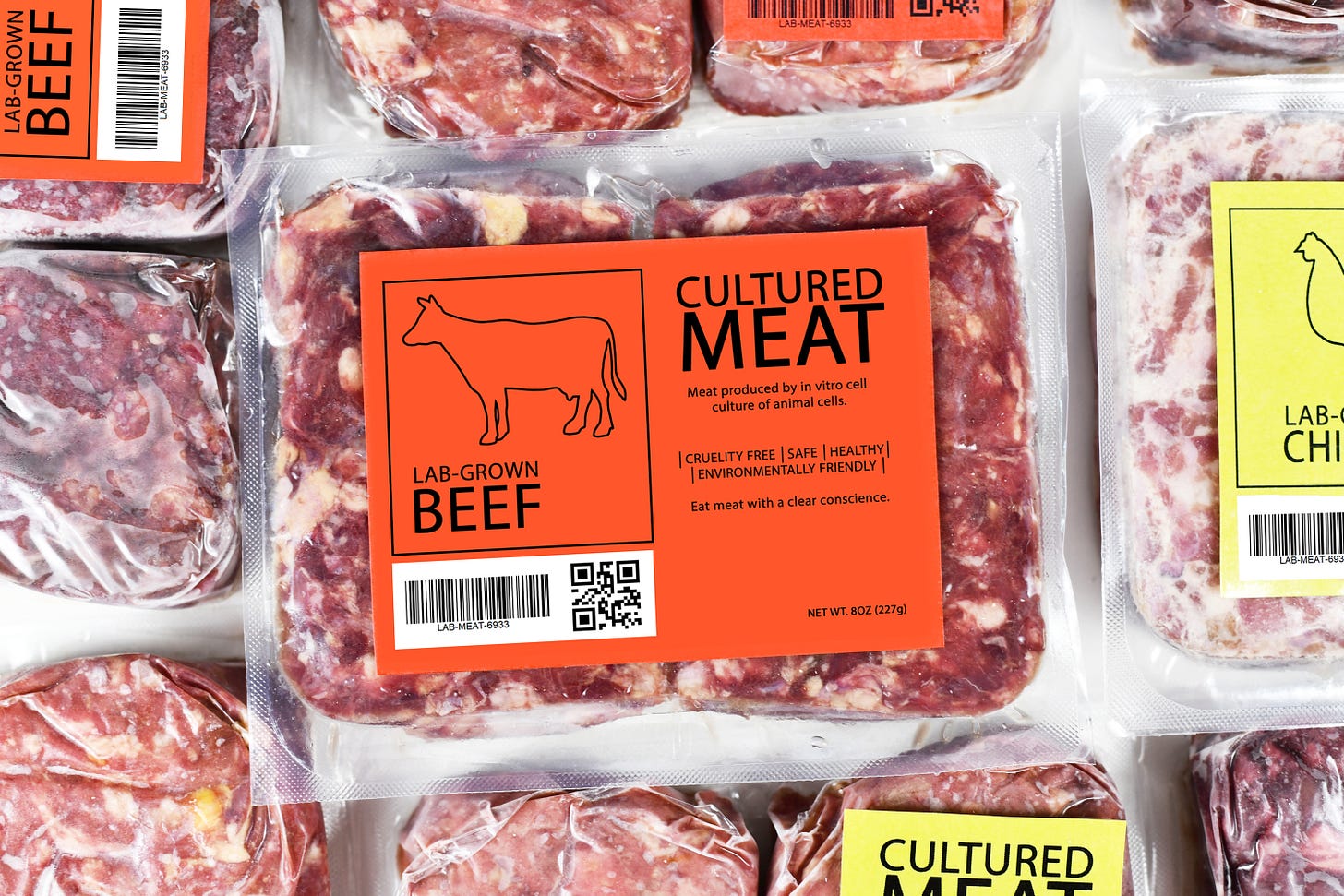Beyond Beyond Meat: Can Lab-Grown Meat Revolutionize Our Plates and Ethics?
Food Science
The rise of plant-based meat alternatives has marked a significant shift in consumer preferences and the food industry landscape. But what if the future of sustainable food goes beyond mimicking meat with plant-based ingredients? Enter lab-grown meat, the next frontier in food production, promising significant ethical and environmental advantages.
‘‘Lab-grown meat represents a groundbreaking shift towards sustainable and ethical food production, promising to significantly reduce environmental impacts and animal welfare concerns, while offering enhanced nutritional benefits. This innovation could fundamentally transform our food systems, making it a pivotal moment in the quest for a more sustainable future.’’
This article explores the potential of lab-grown meat to revolutionize our food system while addressing the ethical considerations surrounding its adoption.
Understanding Lab-Grown Meat
Unlike plant-based alternatives, lab-grown meat (also called cultured meat) is created by extracting animal cells, multiplying them in a controlled environment, and nurturing them into muscle tissue. This process eliminates the need for raising and slaughtering animals, offering a potentially more humane and sustainable option. Additionally, compared to traditional meat production, lab-grown meat boasts significant environmental benefits:
Reduced greenhouse gas emissions: Livestock farming contributes heavily to greenhouse gas emissions. Lab-grown meat production eliminates the need for animal agriculture, leading to a significant reduction in emissions.
Lower land use: Traditional livestock farming requires vast tracts of land for grazing and feed production. Lab-grown meat requires far less land, freeing up land for other uses and reducing deforestation.
Conserved water resources: Livestock farming consumes a significant amount of water. Lab-grown meat production uses significantly less water, contributing to water conservation efforts.
Addressing Ethical Concerns
While the potential benefits of lab-grown meat are promising, ethical considerations remain:
Animal welfare: While lab-grown meat eliminates the suffering associated with traditional farming, the initial extraction of animal cells may raise concerns for some. Further research and refinement are needed to ensure minimal harm during this process.
Health and safety: As a new technology, concerns exist regarding the long-term health effects of consuming lab-grown meat. However, regulatory oversight and stringent safety standards are being developed to ensure the safety of this new food source.
Economic and Social Implications
The adoption of lab-grown meat may have far-reaching economic and social consequences:
Impact on traditional livestock farming: The widespread adoption of lab-grown meat could significantly impact the traditional livestock farming industry, potentially causing job losses and economic hardship for those involved. Transition plans and support systems would be crucial to mitigate these negative impacts.
New economic opportunities: The lab-grown meat industry could create new job opportunities in areas like biotechnology, production, and research.
Consumer acceptance: Public perception and consumer acceptance will be crucial for the success of lab-grown meat. Addressing consumer concerns and ensuring transparency about the production process will be essential.
Challenges and Future Directions
Despite its potential, lab-grown meat still faces challenges:
Technological hurdles: Scaling up production remains a challenge. Further research and development are needed to improve the efficiency and affordability of the technology.
Consumer skepticism: Overcoming consumer skepticism about the safety and "unnaturalness" of lab-grown meat will require education and open communication.
Nutritional profile: Ensuring the nutritional profile of lab-grown meat matches its traditionally produced counterpart is crucial for consumer acceptance and health benefits.
Conclusion
Lab-grown meat presents a revolutionary opportunity to transform our food system, offering ethical, environmental, and potentially even health benefits. While challenges remain, further research, investment, and public discourse are crucial to address them. By fostering collaboration among consumers, policymakers, and industry stakeholders, we can navigate the complexities of this emerging technology and pave the way for a more sustainable and humane future of food.
Sources:
Good Food Institute: https://gfi.org/
Beyond Meat: https://www.beyondmeat.com/newsroom/
Cultivated Meat: https://www.whatiscultivatedmeat.com/society
Visit Our Amazon Store!
All sales of our Vegan Products help promote animal rights worldwide!
General Resources
Books:
Dominion: The Power of Animals in Nature and in Our Imagination by Matthew Scully
Animal Liberation by Peter Singer
Eating Animals by Jonathan Safran Foer
A Billion Hungry Mouths: Feeding the World Without Consuming the Planet by Colin Tudge
Websites and organizations:
Documentaries:
Articles:
"The Case for Animal Rights" by Tom Regan
‘‘Why We Love Dogs, Eat Pigs, and Wear Cows: An Introduction to Carnism’’ by Melanie Joy
‘‘Animal Rights: The Abolitionist Approach’’ by Gary L. Francione
‘‘Fellow Creatures: Our Obligations to the Other Animals’’ by Christine Korsgaard
Seeds of Compassion: Finding Jesus Christ in a Vegan World by Michael Corthell
Receive a single informative article daily at 12:01 AM by email. Explore my homepage with exciting vegan and plant-based news content and delightful and delicious recipes for additional updates. Stay connected to the vegan world and all it has to offer.
Visit The Vegan Project Global our Facebook page for more vegan outreach and education.
Also, visit our new YouTube channel
The information on this vegan/plant-based blog is for general informational purposes only. It is not intended as legal, medical, or professional advice. Readers should consult with appropriate professionals for specific advice tailored to their situation. The blog owner is not responsible for any reliance on the information herein.




The question for me is whether lab-grown meat can be developed as an economically viable consumer commodity that's widely accepted by the public before the impact of the environmental crisis makes it redundant and not a solution. In other words, before it's too late!